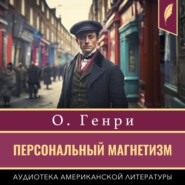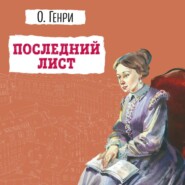По всем вопросам обращайтесь на: info@litportal.ru
(©) 2003-2024.
✖
Roads of Destiny
Настройки чтения
Размер шрифта
Высота строк
Поля
"Let me tell you, then, for you need no excuse," stammered the poet. "I live in the top floor – the small room where the stairs turn."
"In the front room?" asked the lady, turning her head sidewise.
"The rear, madame."
The lady sighed, as if with relief.
"I will detain you no longer then, monsieur," she said, employing the round and artless eye. "Take good care of my house. Alas! only the memories of it are mine now. Adieu, and accept my thanks for your courtesy."
She was gone, leaving but a smile and a trace of sweet perfume. David climbed the stairs as one in slumber. But he awoke from it, and the smile and the perfume lingered with him and never afterward did either seem quite to leave him. This lady of whom he knew nothing drove him to lyrics of eyes, chansons of swiftly conceived love, odes to curling hair, and sonnets to slippers on slender feet.
Poet he must have been, for Yvonne was forgotten; this fine, new loveliness held him with its freshness and grace. The subtle perfume about her filled him with strange emotions.
On a certain night three persons were gathered about a table in a room on the third floor of the same house. Three chairs and the table and a lighted candle upon it was all the furniture. One of the persons was a huge man, dressed in black. His expression was one of sneering pride. The ends of his upturned moustache reached nearly to his mocking eyes. Another was a lady, young and beautiful, with eyes that could be round and artless, as a child's, or long and cozening, like a gypsy's, but were now keen and ambitious, like any other conspirator's. The third was a man of action, a combatant, a bold and impatient executive, breathing fire and steel. He was addressed by the others as Captain Desrolles.
This man struck the table with his fist, and said, with controlled violence:
"To-night. To-night as he goes to midnight mass. I am tired of the plotting that gets nowhere. I am sick of signals and ciphers and secret meetings and such baragouin. Let us be honest traitors. If France is to be rid of him, let us kill in the open, and not hunt with snares and traps. To-night, I say. I back my words. My hand will do the deed. To-night, as he goes to mass."
The lady turned upon him a cordial look. Woman, however wedded to plots, must ever thus bow to rash courage. The big man stroked his upturned moustache.
"Dear captain," he said, in a great voice, softened by habit, "this time I agree with you. Nothing is to be gained by waiting. Enough of the palace guards belong to us to make the endeavour a safe one."
"To-night," repeated Captain Desrolles, again striking the table. "You have heard me, marquis; my hand will do the deed."
"But now," said the huge man, softly, "comes a question. Word must be sent to our partisans in the palace, and a signal agreed upon. Our stanchest men must accompany the royal carriage. At this hour what messenger can penetrate so far as the south doorway? Ribouet is stationed there; once a message is placed in his hands, all will go well."
"I will send the message," said the lady.
"You, countess?" said the marquis, raising his eyebrows. "Your devotion is great, we know, but – "
"Listen!" exclaimed the lady, rising and resting her hands upon the table; "in a garret of this house lives a youth from the provinces as guileless and tender as the lambs he tended there. I have met him twice or thrice upon the stairs. I questioned him, fearing that he might dwell too near the room in which we are accustomed to meet. He is mine, if I will. He writes poems in his garret, and I think he dreams of me. He will do what I say. He shall take the message to the palace."
The marquis rose from his chair and bowed. "You did not permit me to finish my sentence, countess," he said. "I would have said: 'Your devotion is great, but your wit and charm are infinitely greater.'"
While the conspirators were thus engaged, David was polishing some lines addressed to his amorette d'escalier. He heard a timorous knock at his door, and opened it, with a great throb, to behold her there, panting as one in straits, with eyes wide open and artless, like a child's.
"Monsieur," she breathed, "I come to you in distress. I believe you to be good and true, and I know of no other help. How I flew through the streets among the swaggering men! Monsieur, my mother is dying. My uncle is a captain of guards in the palace of the king. Some one must fly to bring him. May I hope – "
"Mademoiselle," interrupted David, his eyes shining with the desire to do her service, "your hopes shall be my wings. Tell me how I may reach him."
The lady thrust a sealed paper into his hand.
"Go to the south gate – the south gate, mind – and say to the guards there, 'The falcon has left his nest.' They will pass you, and you will go to the south entrance to the palace. Repeat the words, and give this letter to the man who will reply 'Let him strike when he will.' This is the password, monsieur, entrusted to me by my uncle, for now when the country is disturbed and men plot against the king's life, no one without it can gain entrance to the palace grounds after nightfall. If you will, monsieur, take him this letter so that my mother may see him before she closes her eyes."
"Give it me," said David, eagerly. "But shall I let you return home through the streets alone so late? I – "
"No, no – fly. Each moment is like a precious jewel. Some time," said the lady, with eyes long and cozening, like a gypsy's, "I will try to thank you for your goodness."
The poet thrust the letter into his breast, and bounded down the stairway. The lady, when he was gone, returned to the room below.
The eloquent eyebrows of the marquis interrogated her.
"He is gone," she said, "as fleet and stupid as one of his own sheep, to deliver it."
The table shook again from the batter of Captain Desrolles's fist.
"Sacred name!" he cried; "I have left my pistols behind! I can trust no others."
"Take this," said the marquis, drawing from beneath his cloak a shining, great weapon, ornamented with carven silver. "There are none truer. But guard it closely, for it bears my arms and crest, and already I am suspected. Me, I must put many leagues between myself and Paris this night. To-morrow must find me in my château. After you, dear countess."
The marquis puffed out the candle. The lady, well cloaked, and the two gentlemen softly descended the stairway and flowed into the crowd that roamed along the narrow pavements of the Rue Conti.
David sped. At the south gate of the king's residence a halberd was laid to his breast, but he turned its point with the words; "The falcon has left his nest."
"Pass, brother," said the guard, "and go quickly."
On the south steps of the palace they moved to seize him, but again the mot de passe charmed the watchers. One among them stepped forward and began: "Let him strike – " but a flurry among the guards told of a surprise. A man of keen look and soldierly stride suddenly pressed through them and seized the letter which David held in his hand. "Come with me," he said, and led him inside the great hall. Then he tore open the letter and read it. He beckoned to a man uniformed as an officer of musketeers, who was passing. "Captain Tetreau, you will have the guards at the south entrance and the south gate arrested and confined. Place men known to be loyal in their places." To David he said: "Come with me."
He conducted him through a corridor and an anteroom into a spacious chamber, where a melancholy man, sombrely dressed, sat brooding in a great, leather-covered chair. To that man he said:
"Sire, I have told you that the palace is as full of traitors and spies as a sewer is of rats. You have thought, sire, that it was my fancy. This man penetrated to your very door by their connivance. He bore a letter which I have intercepted. I have brought him here that your majesty may no longer think my zeal excessive."
"I will question him," said the king, stirring in his chair. He looked at David with heavy eyes dulled by an opaque film. The poet bent his knee.
"From where do you come?" asked the king.
"From the village of Vernoy, in the province of Eure-et-Loir, sire."
"What do you follow in Paris?"
"I – I would be a poet, sire."
"What did you in Vernoy?"
"I minded my father's flock of sheep."
The king stirred again, and the film lifted from his eyes.
"Ah! in the fields!"
"Yes, sire."
"You lived in the fields; you went out in the cool of the morning and lay among the hedges in the grass. The flock distributed itself upon the hillside; you drank of the living stream; you ate your sweet, brown bread in the shade, and you listened, doubtless, to blackbirds piping in the grove. Is not that so, shepherd?"
"It is, sire," answered David, with a sigh; "and to the bees at the flowers, and, maybe, to the grape gatherers singing on the hill."
"Yes, yes," said the king, impatiently; "maybe to them; but surely to the blackbirds. They whistled often, in the grove, did they not?"

















